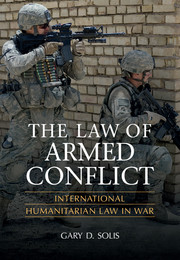Book contents
- Frontmatter
- Contents
- Table of Cases
- Table of Treaties
- Foreword
- Preface
- Acknowledgments
- LAW OF ARMED CONFLICT: INTERNATIONAL HUMANITARIAN LAW IN WAR
- LAW OF ARMED CONFLICT AND INTERNATIONAL HUMANITARIAN LAW: A FRAMEWORK
- LAW OF ARMED CONFLICT AND INTERNATIONAL HUMANITARIAN LAW: BATTLEFIELD ISSUES
- 9 Obedience to Orders, the First Defense
- 10 Command Responsibility and Respondeat Superior
- 11 Ruses and Perfidy
- 12 Torture
- 13 Rules of Engagement
- 14 Targeting
- 15 Attacks on Cultural Property
- 16 The 1980 Certain Conventional Weapons Convention
- 17 Gas, Biological, and Chemical Weapons Treaties
- References
- Index
- References
9 - Obedience to Orders, the First Defense
from LAW OF ARMED CONFLICT AND INTERNATIONAL HUMANITARIAN LAW: BATTLEFIELD ISSUES
- Frontmatter
- Contents
- Table of Cases
- Table of Treaties
- Foreword
- Preface
- Acknowledgments
- LAW OF ARMED CONFLICT: INTERNATIONAL HUMANITARIAN LAW IN WAR
- LAW OF ARMED CONFLICT AND INTERNATIONAL HUMANITARIAN LAW: A FRAMEWORK
- LAW OF ARMED CONFLICT AND INTERNATIONAL HUMANITARIAN LAW: BATTLEFIELD ISSUES
- 9 Obedience to Orders, the First Defense
- 10 Command Responsibility and Respondeat Superior
- 11 Ruses and Perfidy
- 12 Torture
- 13 Rules of Engagement
- 14 Targeting
- 15 Attacks on Cultural Property
- 16 The 1980 Certain Conventional Weapons Convention
- 17 Gas, Biological, and Chemical Weapons Treaties
- References
- Index
- References
Summary
Introduction
“I was only following orders!” The phrase has been heard so often in so many circumstances that it is its own parody. It is a plea mouthed by the relatively innocent junior soldier and by the duplicitous battlefield murderer. Is it a legitimate defense to grave breach charges? Was it ever a legitimate defense to war crimes? In all nations, among any soldier's first catechism is that he shall obey orders. “No military force can function effectively without routine obedience, and it is the routine that is stressed…But there is some ultimate humanity that cannot be broken down, the disappearance of which we will not accept…. Trained to obey ‘without hesitation,’ they remain nevertheless capable of hesitating.”
In 1996, in Berlin, former German Democratic Republic (GDR) border guards who killed German civilians fleeing to the West raised the defense of obedience to superior orders. In Rome, also in 1996, a former S.S. Captain invoked the defense, as did a French National Assembly deputy, in Paris. In International Criminal Tribunal for the Former Yugoslavia (ICTY) trials, Serb and Croat defendants raise the defense today. In Germany, in 1999, a former Gestapo agent was tried for assisting in the murder of 17,000 Jews at the Nazi death camp at Maidanek, Poland, during World War II. His defense: I was only following orders.
Is a soldier immune from punishment because his or her acts were carried out pursuant to the orders of a superior?
- Type
- Chapter
- Information
- The Law of Armed ConflictInternational Humanitarian Law in War, pp. 341 - 380Publisher: Cambridge University PressPrint publication year: 2010



